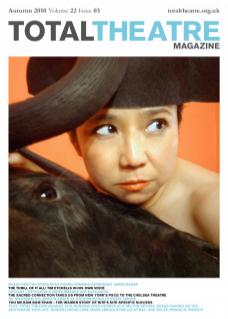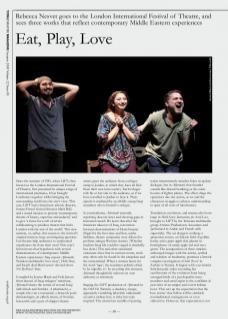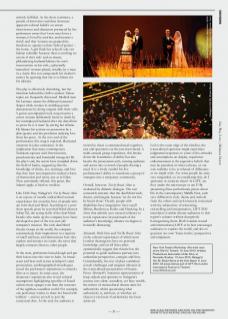Since the summer of 1981, when LIFT, then known as the London International Festival of Theatre, first presented its unique range of international premieres, it has brought Londoners together whilst bringing the surrounding world into the city’s view. This year, LIFT had a brand new artistic director, former Fierce! festival director Mark Ball, and a stated mission to present ‘contemporary theatre of beauty, expertise and audacity’ and to give ‘a focus for a raft of artists collaborating to produce theatre that links London with the rest of the world’. This new mission, or, rather, this return to the festival’s original mission, begs an intriguing question: Can theatre help audiences to understand experiences far from their own? This year’s festival tests that hypothesis with several dramatisations of contemporary Middle Eastern experiences: Iraq exposé Aftermath; Tunisian multimedia ‘love story’, Hobb Story; and Israeli deaf-blind actors’ devised show Not By Bread Alone.
Compiled by Jessica Blank and Erik Jensen from dozens of Iraqi refugees’ testimony, Aftermath shares the stories of several Iraqi individuals and families. A pharmacist, a couple who run a restaurant, a brazenly posh dermatologist, an elderly imam, a Christian housewife and a pair of chipper theatre artists greet the audience from a refugee camp in Jordan, to which they have all fled from their war-torn country. Each refugee tells his or her tale to the audience, as if we have travelled to Jordan to hear it. Their speech is mediated by an affable young Iraqi translator who is himself a refugee.
As journodrama, Aftermath succeeds, reporting obscure news and showing gaps in historical record. We learn that after the American takeover of Iraq, conversion between denominations of Islam became illegal for the first time and that, under Saddam, theatre companies were allowed to perform antique Western classics. (Whether modern Iraqi life could be staged is decidedly less clear.) This and other calculated omissions show that in current events, truth may often only be found in the unspoken and the untranslated. When a woman hunts for the word ‘rape’, the translator politely offers ‘to be impolite to’. In revealing this moment, Aftermath thoughtfully subverts its own authority as testimony.
Staging the LIFT production of Aftermath in the Old Vic Tunnels, a shadowy, creepy, apparently crumbling labyrinth underneath an active railway line, is risky but truly inspired. The monstrous rumble of passing trains intermittently smashes holes in spoken dialogue, but in Aftermath, that thunder sounds like distant bombing or the sonic booms of fighter planes. The effect drags the spectators into the action, as we and the characters struggle to achieve understanding in spite of all sorts of interference.
Translation, revelation, and trauma also loom large in Hobb Story: Instructions for Arab Love, brought to LIFT by the Tunisian multimedia group Artistes Producteurs Associates and performed in Arabic and French with supertitles. The set design is striking: a projection screen, an Edenic field of golden barley and a giant apple that gleams in hemispheres of candy-apple red and envy green. The juxtaposition of these timeless archetypal images with the screen, symbol and window of modernity, promises a bravely complex investigation of hobb (‘love’ in Arabic) in Tunisia. It begins with a revisionist Scheherazade video-recording her recollections of the evolution from being arranged bride of a psychopathic mass murderer and serial rapist to the confident de facto ruler of an empire and covert lesbian lover. This sets up the expectation that the ‘love stories’ that follow will be similarly non-traditional, transgressive or even subversive. However, that expectation is not entirely fulfilled. As the show continues, a parade of interviews and skits showcase apparent cultural beliefs: on screen interviewees and characters portrayed by live performers assert that ‘every man loves a woman, is loved by another, and marries a third’, and that ‘women are granted the freedom to operate in their field of genius’ – the home. A girl finds her school’s sole out lesbian tolerable ‘because there is nothing we can do if she’s sick’ and an absent, philandering husband blames his son’s transvestism on his wife, a physically ‘masculine’ woman played, notably, by a man in a chador. Her son compounds his mother’s misery by agreeing that she is to blame for his identity.
The play is effectively disturbing, but the intention behind the chill is unclear. Taboo topics are frequently discussed. Medical men list Latinate names for different hymeneal shapes while women in wedding gowns demonstrate by doing origami with their veils. A guitar-accompanied rock song mourns a career woman deliberately burnt to death by her unemployed husband after she dared him to prove he is ‘a man’ by setting her aflame. He blames his actions on possession by a djinn (genie) and she proclaims undying love from her grave. At the very end of the performance this song is reprised, illustrated on-screen in jokey animation. Is the implication that many contemporary Tunisians espouse such heterosexism, pseudoscience and homicidal misogyny? By the play’s end, the actors have trampled down the field of barley, suggesting that the knowledge of desire, sex, marriage, and love that they have just imparted is indeed a force of destruction and waste, just as in Eden. Thus uncritically offered, this point, like Adam’s apple, is hard to swallow.
Like Hobb Story, Nalaga’at’s Not by Bread Alone is an expose of usually undescribed sensual experiences: the everyday lives of people who are both deaf and blind. According to a postshow speech given by non-deaf-blind director Adina Tal, the acting skills of the deaf-blind Israelis who make up the company have been developed as part of the ten-year-old company’s mission. The only deaf-blind theatre troupe in the world, the company communicate their impressions in a tapestry of smell and heat, and demonstrate how they explore and interact via touch, the sense that largely connects them to other people.
At the start, performers knead dough and put their loaves into the oven to bake. As breadscent and heat waft across artsdepot’s staid proscenium, autobiographical monologues reveal the performers’ aspirations: to attend a film or to marry. In some cases, the characters’ aspirations also reveal cultural assumptions highlighting specifics of Israeli culture more opaque even than the contours of the sightless-soundless world. For example, one performer wishes to share her bread with ‘soldiers’ – and we are left to join the contextual dots. At the end, the audience is invited to share a communal meal: together, cast and spectators eat the just-risen bread. A multi-sensual group experience, this breaks down the boundaries of ability but also breaks the proscenium arch, turning audience and actors into a crowd of people sharing a meal. It is a lovely symbol for live performance’s ability to transform a group of strangers into a temporary community.
Overall, however, Not by Bread Alone is weakened by didactic dialogue. The cast constantly reiterate that the deaf-blind wish, dream, and imagine because ‘we do not live by bread alone.’ Clearly, people with disabilities have imaginative lives: recall Milton, Beethoven, Keller and Hawking. In a show that adroitly uses sensual evidence to reveal experiences beyond much of the audience’s knowledge, reliance on dogma is ironically dismaying.
Aftermath, Hobb Story and Not By Bread Alone evoke cultural experiences of which most London theatregoers have no personal knowledge, and yet all three plays optimistically suggest that theatre has the potential to guide audiences partway into unfamiliar perspectives, energies and lives. Coincidentally, the trio of plays combined reveals challenges and enigmas inherent in the transcultural presentation of theatre. From Aftermath’s American representation of Iraqi ordeals and opinions to Nalaga’at’s journey into silent, soundless, yet busy worlds, the mirror of transcultural theatre aims for authenticity whilst questioning what authenticity is, and how, or whether, an observer can know if authenticity has been achieved.
Led to the outer edge of the familiar, the transcultural spectator might experience judgmental responses to some of the attitudes and assumptions on display, experience embarrassment at the regressive beliefs that may be prevalent in other cultures, or our own inability to be as tolerant of difference as we might wish. Are some people far away very misguided, or, in considering this, do I patronise or exoticise them? At LIFT, are they under the microscope or am I? By presenting three performance pieces about life in the contemporary Middle East, each very different in style, theme and outlook from the others and each intensely concerned with the subjectivity of witnessing, storytelling and interpretation, LIFT 2010 introduces London theatre audiences to this region’s cultures without deceptively homogenising them. Both London-rooted and international, LIFT at its best encourages audiences to explore the world, and also to question our own ‘home truths,’ perspectives and judgments.
New York Theatre Workshop Aftermath seen at the Old Vic Tunnels, 10 June 2010. Artistes Producteurs Associates Hobb Story at Riverside Studios, 10 June 2010. Nalaga’at Not By Bread Alone at the Arts Depot 11 June 2010. All presented as part of LIFT (the London International Festival of Theatre). www.liftfestival.com


